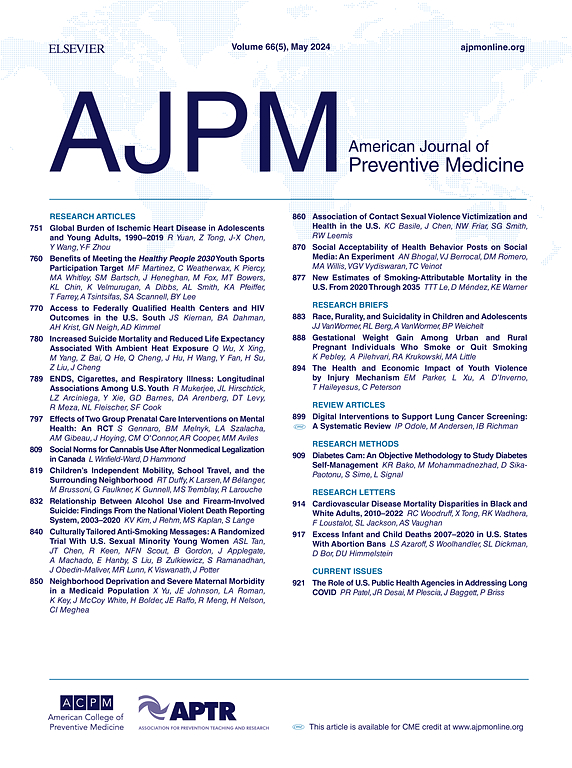重度吸烟与轻度吸烟:吸烟与阿片类药物使用、慢性疼痛和心理健康的关系。
IF 4.3
2区 医学
Q1 MEDICINE, GENERAL & INTERNAL
引用次数: 0
摘要
导言:药物使用治疗计划很少与戒烟计划相结合,这一点备受关注。在此,我们首次就重度吸烟与轻度吸烟和阿片类药物流行之间的联系提供了全国性统计数据:方法:利用与全国健康访谈调查(N=8.14万成人年)相关联的2013-2021年医疗支出小组调查,通过logit回归估计重度吸烟与轻度吸烟对阿片类药物使用、慢性疼痛、因疼痛导致的工作限制以及不良心理健康的影响。分析时间为 2023 年 10 月至 2024 年 5 月:只有 37% 的人曾经吸烟,但他们每年使用的阿片类处方药却占全国的 69%。每天吸烟超过五支的成年人占总人口的 12%,但他们使用的阿片类药物数量与 63% 从未吸烟的人大致相同。曾经吸烟的成年人使用阿片类药物的数量比目前吸烟的成年人少16%(结论):在各国应对阿片类药物流行的过程中,将戒烟计划纳入药物滥用治疗计划似乎是明智之举:AHRQ.本文章由计算机程序翻译,如有差异,请以英文原文为准。
Heavy Versus Light Smoking: Its Association With Opioid Use, Chronic Pain, and Mental Health
Introduction
There is much concern that substance use treatment programs are rarely integrated with smoking cessation programs. Here, the first national statistics are presented on the connection between heavy vs. light smoking and the opioid epidemic.
Methods
Using the 2013–2021 Medical Expenditure Panel Survey linked to the National Health Interview Survey, N=81,400 adults-years, logit regressions estimate the impact of heavy vs. light smoking on opioid use, chronic pain, work limitations due to pain, and poor mental health. Analyses were conducted from October 2023 to May 2024.
Results
Only 37 percent of the population has ever smoked, but they used 69% of the nation's annual prescription opioids. Adults who smoked more than 5 cigarettes a day composed 12% of the population but used about the same number of opioids as the 63% of the population who never smoked. Adults who formerly smoked used 16% fewer opioids than adults who currently smoke (p<0.01). The percent with chronic pain during the year varied from 12.2% for adults who never smoked to 14.2% for light smoking, to 16.5% for those smoking more than a pack a day (p<0.01). Severe work limitations due to pain varied from 7.3% for adults who never smoked to 16.9% for those smoking more than a pack a day (p<0.01). Adults smoking more than a pack a day were twice as likely to report fair or poor mental health compared to those who never smoked (29.2% vs 13.6%) (p<0.01).
Conclusions
As nations deal with the opioid epidemic, integrating smoking cessation programs into substance abuse treatment programs appears prudent.
求助全文
通过发布文献求助,成功后即可免费获取论文全文。
去求助
来源期刊

American Journal of Preventive Medicine
医学-公共卫生、环境卫生与职业卫生
CiteScore
8.60
自引率
1.80%
发文量
395
审稿时长
32 days
期刊介绍:
The American Journal of Preventive Medicine is the official journal of the American College of Preventive Medicine and the Association for Prevention Teaching and Research. It publishes articles in the areas of prevention research, teaching, practice and policy. Original research is published on interventions aimed at the prevention of chronic and acute disease and the promotion of individual and community health.
Of particular emphasis are papers that address the primary and secondary prevention of important clinical, behavioral and public health issues such as injury and violence, infectious disease, women''s health, smoking, sedentary behaviors and physical activity, nutrition, diabetes, obesity, and substance use disorders. Papers also address educational initiatives aimed at improving the ability of health professionals to provide effective clinical prevention and public health services. Papers on health services research pertinent to prevention and public health are also published. The journal also publishes official policy statements from the two co-sponsoring organizations, review articles, media reviews, and editorials. Finally, the journal periodically publishes supplements and special theme issues devoted to areas of current interest to the prevention community.
 求助内容:
求助内容: 应助结果提醒方式:
应助结果提醒方式:


